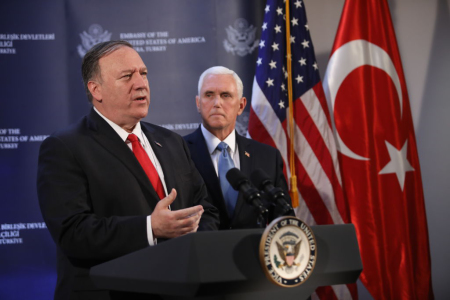US, Turkey agree to 5-day 'ceasefire' in Syria, Vice President Mike Pence says

Turkish leaders have agreed to a five-day "pause" to its incursion in northern Syria after an hourslong meeting with the U.S. Vice President Mike Pence and Secretary of State Mike Pompeo on Thursday.
The announcement was made by Pence after the meeting in Ankara. Under the agreement, Turkey will pause its invasion of Kurdish-held areas in Syria along the Turkish border for 120 hours.
This will allow Kurdish Syrian Defense Forces to withdraw from a nearly 20-mile-wide designated safe zone along Turkey’s southern border.
In exchange, the U.S. agreed not to place additional sanctions on Turkey and to lift sanctions recently imposed on Turkey if the ceasefire becomes permanent. The agreement does not force Turkey to withdraw its forces from Syria.
The agreement comes about a week after Turkish forces crossed into Syria in an attempt to expel Kurdish forces that were once backed by the U.S. in the fight against the Islamic State. Turkey has long argued the Kurdish rebels in Syria are “terrorist” outfits aligned with the Kurdistan Workers Party (PKK), a Kurdish separatist group in Turkey.
Supporters have argued that Kurdish rebels in Syria that were backed by the U.S. in the fight against the Islamic State have no connections with the PKK. However, Gen. Mazlum Abdi, the leader of the Syrian opposition forces led by the Kurdish People's Protection Unit, used to be part of the PKK, which has waged a decadeslong battle with Turkey.
Two days after Turkey's President Recep Tayyip Erdoğan warned that a military offensive was planned, President Donald Trump ordered around 50 U.S. soldiers in the area to pull back, which drew the ire of some of his evangelical supporters because it paved the way for the Turkish offensive in the autonomous region of northern Syria.
“Today, the United States and Turkey have agreed to a ceasefire in Syria,” Pence said during remarks to the press. “Turkish side will pause 'Operation Peace Spring' in order to allow for the withdrawal of YPG forces from the safe zone for 120 hours. All military operations under Operation Peace Spring will be paused. Operation Peace Spring will be halted entirely on completion of the withdraw.”
Pence added that the Trump administration has been in contact with SDF forces and said that they already began their withdrawal from the safe zone south of the Turkish border in Syria.
“Let me say this also includes an agreement by Turkey to engage in no military action against the community of Kobane,” Pence added, speaking of a Syrian town once controlled by the Islamic State. “In addition, the United States and Turkey have both mutually committed to a peaceful resolution and future for the safe zone, working on an international basis to ensure that peace and security define this border region.”
Although Pence referred to the agreement as a "ceasefire," Turkey’s Foreign Minister, Mevlut Cavusoglu refuted such a description and said that it was only a "pause for our operation.” Cavusoglu contended “as a result of our president’s skillful leadership, we got what we wanted.”
Democratic leaders in Congress blasted the Trump administration’s agreement to lift sanctions on Turkey in the deal.
In a joint statement, Speaker of the House Nancy Pelosi, D-Calif., and Senate Minority Leader Chuck Schumer, D-N.Y., called the agreement a “sham” that “undermines the credibility of America’s foreign policy."
“President Erdogan has given up nothing and President Trump has given him everything," the Democrat leaders argued. "The Turks have stated that ‘this is not a ceasefire,’ and made clear that they ‘will pause the operation for 120 hours in order for the terrorists to leave’ — referring to the courageous Kurdish fighters who have suffered nearly 11,000 casualties in our fight to defeat ISIS."
"This agreement also does nothing to stop thousands of ISIS prisoners from escaping, and shows the president’s complete lack of strategy to defeat ISIS," they continued. "To say that Turkey and Syria will guard the prisoners is outrageous and puts our homeland security at risk. ISIS is still a threat, certainly now more than before President Trump gave Erdogan the green light to invade Syria."
It has been reported that seven IS terrorists have escaped the prison camp and around 100 other affiliates have also fled.
Schumer and Pelosi added that such an agreement “sends a dangerous message to our allies and adversaries alike that our word cannot be trusted.”
In an interview with The Hill on Thursday, Sen. Rand Paul, R-Ky., said he supported the president's decision to withdraw troops from Syria.
“The Kurds are going to better aligned with Assad because they frankly need a Syrian sponsor,” Paul told Hill.TV. “We were never staying there — the president never promised to stay there, he said we’re going to wipe out ISIS, we did.”
However, a majority of Paul's Republican colleagues also disagree. Sen. Lindsey Graham, R-S.C., called the president's decision "disaster in the making."
In response Trump said at a news conference on Wednesday, "Lindsey Graham would like to stay in the Middle East for the next thousand years with thousands of soldiers and fighting other people's wars. I want to get out of the Middle East."
Follow Samuel Smith on Twitter: @IamSamSmith
or Facebook: SamuelSmithCP





















